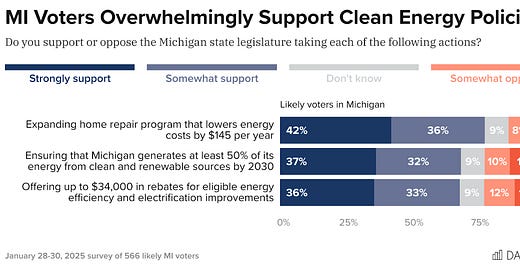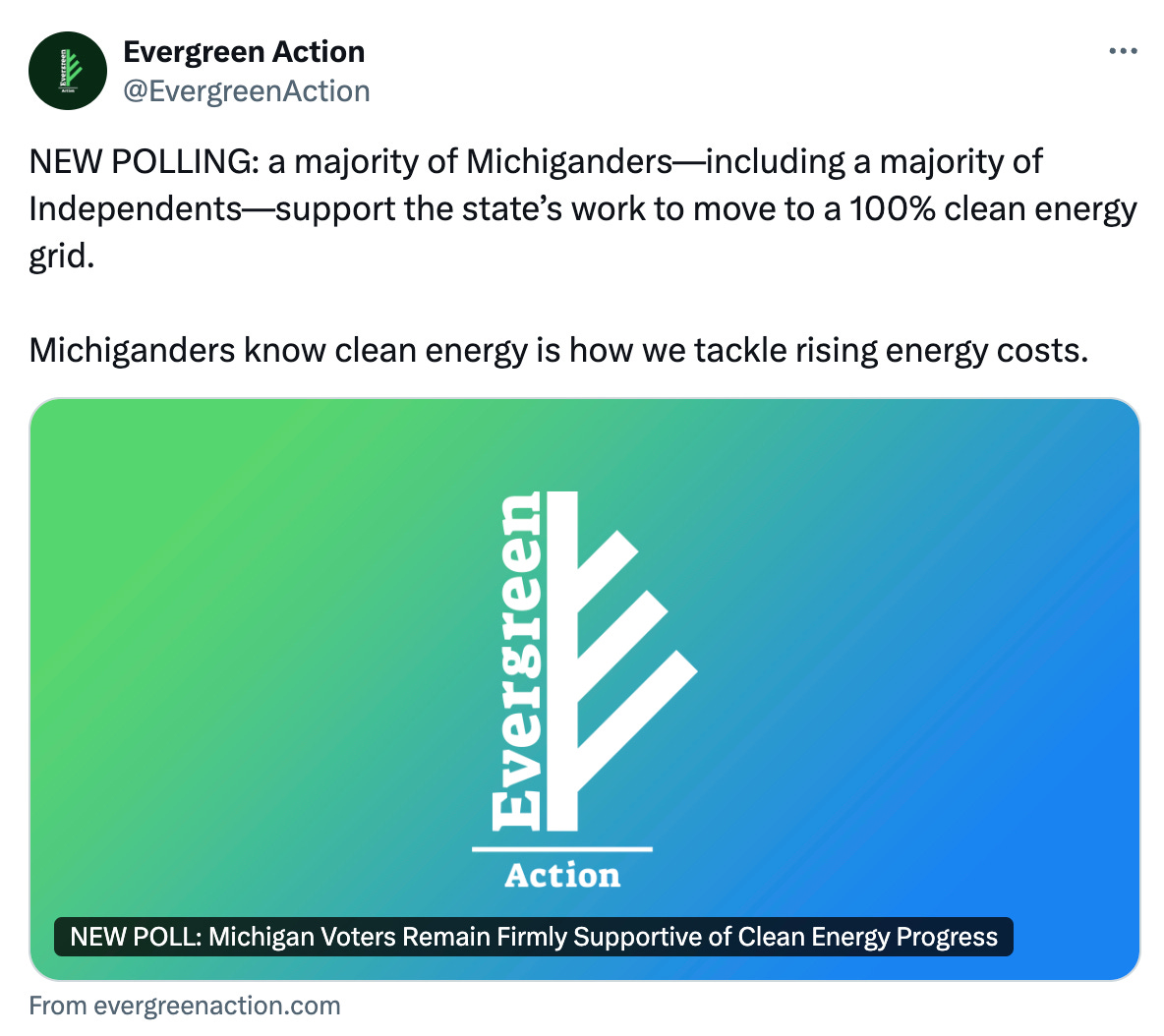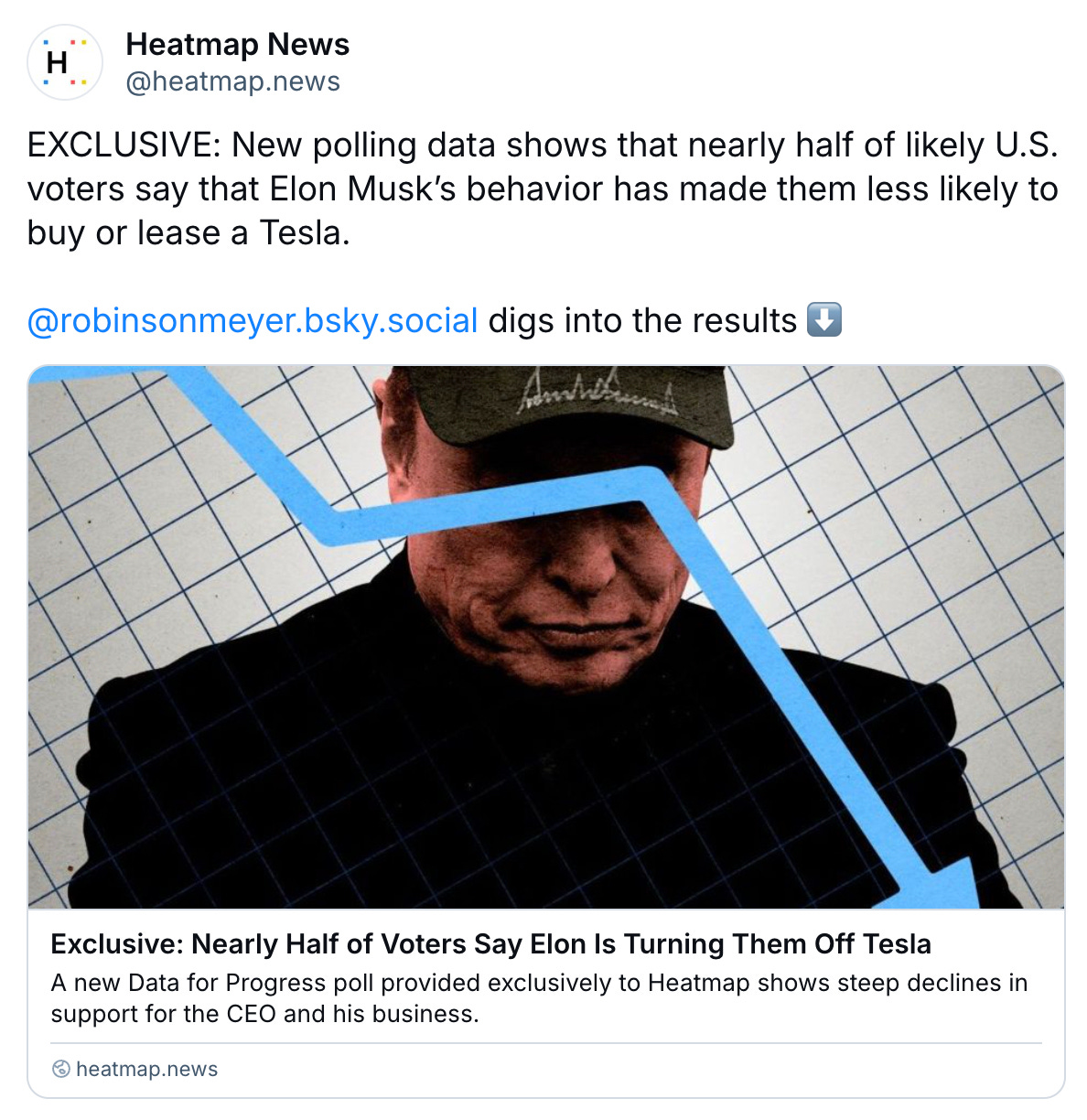Michigan Voters Support Big Green Gretch
Welcome back to Data for Climate Progress — your one-stop shop for all things climate at Data for Progress.
Welcome back to Data for Climate Progress — your one-stop shop for all things climate at Data for Progress. Catch us here every month for our latest climate polling, juicy insights, and can’t-miss reading lists.
As always, we’d love to hear from you — drop us (Grace Adcox and Catherine Fraser) a line at gracea@dataforprogress.org and catherine@dataforprogress.org. Forwarded this email? You can subscribe below.
Time to Boycott Tesla
In an exclusive with Heatmap News, we find that nearly half of likely U.S. voters (45%) say that Elon Musk has made them less likely to buy or lease a Tesla (to say nothing of the Cybertruck). This includes 66% of Democrats and 50% of Independents. Just 17% say that they are more likely to purchase one. And who would blame them? Our data shows that Musk’s proposals are widely unpopular and that most voters think Musk has too much influence over federal government decisions.
Locked in the Bathroom at Yosemite? It’s Been Nice Knowing You – Elon Musk Laid off the Locksmith
In perhaps one of the most asinine moves since naming the department “DOGE,” the Trump administration’s Musk-led Department of Government Efficiency laid off more than 3,000 U.S. National Park Service and U.S. Forest Service workers this month. From park rangers and environmental educators, to locksmiths and trail maintenance and wildfire prevention workers, the layoffs cut deeply across each agency. News flash: Voters are concerned. New polling from Data for Progress finds that two-thirds of likely voters (66%) report that they are “very concerned” or “somewhat concerned” about these staffing cuts, including their economic impacts and implications for wildfire risk. What’s more, we find that only 10% of voters support decreasing federal funding for national parks and forests. Instead, an overwhelming majority of voters support either increasing funding (30%) or keeping funding the same (53%). Proof that Elon Musk hasn’t gone outside and touched grass in a reallllllly long time? We think so. Read the full brief here.
California Dreaming About Holding Fossil Fuel Companies Accountable
In the wake of the recent wildfires in California, the Center for Climate Integrity and Data for Progress recently surveyed likely voters across the state, including an oversample of Los Angeles County, to investigate awareness of the California Fair Access to Insurance Requirements (FAIR) Plan and understand attitudes toward the climate change-fueled home insurance crisis. California voters see it like it is: A majority of voters (57%) statewide say the fossil fuel industry is very or somewhat responsible for the recent wildfires. After reading about a proposal similar to California Senate Bill 222 – which would enable individuals and insurance companies harmed by climate disasters and extreme weather events (like the recent wildfires) to recover their losses from oil and gas companies directly – 60% of voters support the proposal. Read the full brief here.
Voters Support Carbon Removal, but Still Know Little About It
Building on nearly five years of research on carbon removal – much of it spent building the case for anti-fossil fuel carbon removal and calling out industry greenwashing – Data for Progress recently surveyed voters to understand attitudes toward carbon removal, finding most voters still have heard nothing at all about carbon removal. After reading more about carbon removal, however, nearly two-thirds of voters (65%) say they have a favorable opinion of carbon removal. These findings mirror strong support for carbon removal found in surveys of likely voters and American adults in 2021 and 2023. DFP will continue to work to explicitly limit the role of the fossil fuel industry, whose actions necessitate the need for carbon management in the first place and whose bottom line presents a direct conflict of interest with climate policy, in carbon removal. Full findings here.
Citizens’ Assemblies Can Help Build For Our Climate and Democracy
With federal climate policy largely out of reach for the next four years, DFP’s Catherine Fraser explores how citizens’ assemblies can help us build at the state and local level for our climate and democracy in a new Insights piece. Climate justice in technology deployment requires decarbonizing at the pace and scale needed while addressing persistent global inequalities, ensuring restorative justice, and advancing democracy. To that end, a just transition requires first asking communities what they envision for their futures — and citizens’ assemblies can do just that. Much like jury duty, citizens’ assemblies bring together a random, representative sample of people from a given community to learn about and deliberate on a given issue, and ultimately craft and deliver a series of recommendations for government officials to implement. Assemblies can be forums for crafting a bottom-up approach to climate policy and development that this moment requires. Read the full piece here.
Michigan Voters Are Enthusiastic About Climate Action
By Grace Adcox and Brian Burton
As the climate movement faces headwinds (to say the least…) federally, it is more important than ever to find opportunities to advance bold climate action at the state and local levels. Michigan understands this better than most: Gov. Gretchen Whitmer announced the Michigan Healthy Climate Plan in 2020, and, since then, has directed the state legislature to make the most of state and federal opportunities to deploy clean energy, enhance energy efficiency, and expand clean transportation.
Reflecting on Michigan’s strong climate leadership and potential to deliver ambitious climate action in the future, Data for Progress and Evergreen Action surveyed Michigan likely voters to understand their views. We find that Michigan voters are keenly aware of climate change and concerned about its impacts. Furthermore, they support a wide range of policies that would not only advance climate progress, but also create good-paying jobs and lower energy costs for Michigan families, among other goals.
Voters in Michigan overwhelmingly support policies that can lower energy costs and promote clean energy development. These include expanding a home repair program that could lower energy costs by $145 per year (78% support), ensuring that Michigan generates at least 50% of its energy from clean sources by 2030 (69% support), and offering rebates for energy efficiency improvements (69% support).
Voters across partisanship also overwhelmingly support Michigan investing in policies to create new local clean energy and manufacturing jobs. In particular, investments in clean transportation and pollution reduction are popular across party lines, while voters also support increased transparency and accountability for utility companies. Unsurprisingly, Michigan voters have consistently shown that they view clean energy solutions and investments favorably, and want their state legislature to enact further climate policy.
Michigan voters are excited to see state officials continue to take the lead on clean energy adoption. They strongly support the steps that the legislature has already taken on this front, and this polling clearly shows appetite among the electorate for more. Read the full survey brief here.














